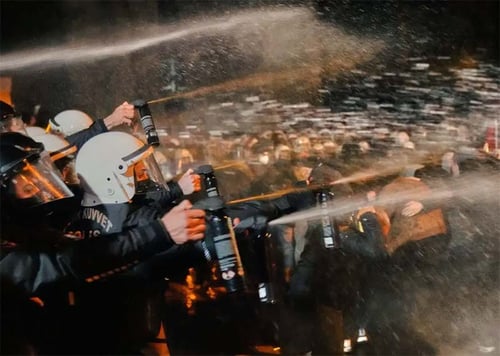
How Türkiye almost became an autocracy in seven days
Tuesday, 18 March. Today, the potential final days of Türkiye's already dwindling democracy started. It all began with an alleged bureaucratic mishap, barring Recep Tayyip Erdoğan's strongest opponent from challenging him in a presidential election. Ekrem İmamoğlu's bachelor's degree was invalidated, as he allegedly misfiled a university transfer over 30 years ago. Any presidential candidate in Türkiye must hold a diploma.
Meanwhile, the opposition has long questioned the validity of Erdoğan's university degree, which perhaps explains the president's obsession with restricting higher education. Ever since a failed coup attempt in 2016, Erdoğan has cracked down on universities across the country, appointing new rectors and unleashing riot police on students. It's still considered a criminal offence to question the president's alleged degree in business administration, for which journalists have been imprisoned.
Protests against İmamoğlu's arrest begin at the Istanbul town hall in Saraçhane.
Wednesday and Thursday, 19 and 20 March. Early morning, İmamoğlu, alongside 91 others, is detained and jailed on charges of corruption and terrorism. The charges are substantiated by anonymous witnesses and a recording of İmamoğlu counting money at his lawyers' office. The governor of Istanbul, an Erdoğan-appointed representative, orders a protest ban for four days.
The opposition calls the arrest the 'coup of 19 March'. Thousands gather in Saraçhane.
Friday, 21 March. Tractors decorated with countless Türkiye flags join the protest in the province of Konya. This is a surprising sight, given that Konya, together with other more rural Central Anatolian provinces, relentlessly supports the ruling Justice and Development Party (AKP). The provinces even stayed true to Erdogan's party during last year's local elections, which the AKP lost to the opposition.
The strong grip of state-run TV channels in the region partially explains this support. Most state-owned and adjacent channels routinely spread misinformation and censorship. Journalists are already among those arrested in this week’s protests. As Türkiye continues to plummet down the ranking of the Press Freedom Index, social media news consumption of independent outlets is on the rise.
This Friday, 200,000 people gather at Saraçhane.
Saturday, 22 March. It's been an expensive week for the country. The Turkish lira plummeted in value again. To stabilise the situation, the Turkish central bank used 79% of its foreign exchange reserves (about $26 billion). It took the central bank a full year to save that money, and now they spent it all in three days.
These numbers are nothing new. Türkiye has suffered under an enormous economic crisis, with inflation rates at 40-60% for the past 6 years. The government's long mismanagement of the economy couldn't be turned around by new presidential appointees, either. The worst hit by the cost of living crisis are minimum wage workers and retirees. Since 2021, the minimum wage has been lower than the average cost of rent in Istanbul.
Saraçhane hosted 550,000 people tonight.
Sunday, 23 March. İmamoğlu is formerly imprisoned on corruption charges, awaiting court trial in one of Türkiye's most notorious prisons. The opposition denies the validity of the charges.
The only disruptions to the speeches by various oppositional figures that I heard at Saraçhane were occasional screams for help as tear-gas-drenched, bleeding protestors were rushed to an ambulance through the record crowd of one million people. The government intensified its violent crackdown on the protests across the country, a common sight during the AKP's 24-year-long rule. Over the past five days, over 1,100 people have been detained for protesting, including ten journalists.
Monday, 24 March, and beyond. None of this is surprising. İmamoğlu himself warned citizens about his arrest a week before. But of course, ”this isn't about İmamoğlu”, as Yusuf Can, the coordinator and analyst of the Middle East Program at the Wilson Center, tells me.
İmamoğlu symbolises much larger issues, from the economy, to press and academic freedom. ”We passed a 'make or break' point, there's no going back from this.” If the mayor of 16 million people can be arrested on unfounded charges, alongside countless journalists and activists, anyone can.
What's next? There are two ways forward: intensifying police violence could eventually quell these protests when they become too dangerous to truly mobilise the masses. This would mean the end to meaningful parliamentary opposition. Erdoğan gambles that public opinion would shift, and the economy would normalise until the next 'election.'
But despite everything, Türkiye isn't a full autocracy yet. Students and the opposition are protesting relentlessly. While a ruling party that consolidated its power over 24 years won't cease its grip in just a week, they show that civil resistance is very much alive – and that it will take time.
As Can argues, ”This is not going to be a one-week thing. These kinds of regimes don't go away that easily. You have to resist. You're going to have to organise locally. Continue with the boycotts. Recruit new people..”